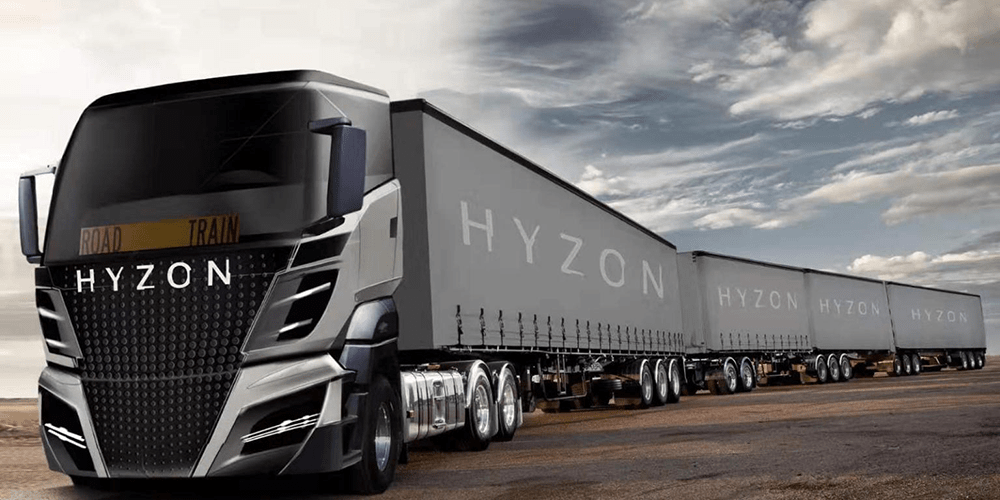Hyzon Zero Carbon Alliance officially launched
The US developer of fuel cell commercial vehicles Hyzon Motors has announced the Hyzon Zero Carbon Alliance. The new coalition of companies from different sectors aims to advance hydrogen mobility worldwide and is headed by Australian Claire Johnson.
In addition to Hyzon Motors, the first members of the alliance are Ark Energy, AXA, Bank of America, Hiringa Energy, Modern Group, NEOM, Raven SR, ReCarbon and energy company Total.
In a first statement, the Alliance says its methods will be to “utilize the collective expertise, resources and capability of its members to foster knowledge and innovation, identify priority projects, create business models and support delivery of attractive solutions enabling customers to viably make the transition to cleaner hydrogen fuel cell commercial vehicles.”
The Hyzon Alliance has been formed around Hyzon Motors, the hydrogen fuel cell heavy-duty commercial vehicle maker. Hyzon Motors only very recently begun in 2019 and officially launched in 2020 as a new standalone business of Horizon Fuel Cell which is also led by Hyzon co-founders George Gu, Craig Knight and Gary Robb. Hyzon Motors commercializes Horizon’s 17 years of hydrogen technology development for the transport sector.
The establishment of Hyzon Motors as a standalone entity fulfilled the purpose, (apart from the desire to decarbonise transport accelerate the energy transition) of manufacturing and supplying hydrogen fuel cell-powered commercial vehicles across the North American, European, and Australasian regions. The company is headquartered in Rochester, NY and the Netherlands and with operations in Europe, Singapore, Australia and China.
Now, the newly formed Hyzon Alliance is inviting and offering collaboration on other aspects of hydrogen commercial vehicle infrastructure and value chains and instigating projects across the globe. So far including hydrogen infrastructure providers, hydrogen fuel suppliers, service and maintenance providers, financiers, insurers and fleet operators. The alliance puts Hyzon Motors in an excellent position of course, but the promotion of these elements in the hydrogen economy will be beneficial to all hydrogen vehicle manufacturers. One of the biggest hurdles for legacy vehicle makers and fuel cell vehicles has been the lack of infrastructure. This is now being tackled by companies willing to collaborate and innovate.
Hyzon’s alliance is taking a similarly holistic approach to Hyundai with their international fuel cell truck business strategy, which targets expansion in the USA, China and Europe. This means infrastructure based on commercial vehicle business cases and customer routes collaborating with localised energy infrastructure providers. Toyota has also been looking into hydrogen value chains and last year created a H2 business unit for Europe for the expansion of hydrogen infrastructure and value chain partnerships to support the company’s business case for hydrogen fuel cell vehicles.
Rather than targeting particular markets, the Hyzon Zero Carbon Alliance appears to be aimed at gathering international partners across the globe to support the deployment of hydrogen vehicles in the commercial vehicle sector. What is unique about this hydrogen Alliance is that it spans from Australia and New Zealand, across Asia and the Middle East to join North America and Europe.
The Alliance will be headed by Australian Claire Johnson, whose career has included being the CEO of the Australian Hydrogen Council, as well as being government liaison manager with Toyota Motor Corporation Australia. She was also the Victorian government policy advisor regarding economic development, transport and resources. Australia is possibly a key player in the hydrogen economy because it is home to relatively endless opportunities for the generation of renewable energy required to produce green hydrogen. The EU Hydrogen Strategy, for example, has committed to utilising green hydrogen for hard-to-decarbonise transport sectors like heavy-duty transport, marine and aviation applications. With the additional interest from both Korea and Japan with advanced hydrogen technologies but limited capacity for making green hydrogen, Australia is being considered a potential hydrogen export nation.
Also on the Antipodean side of the globe, New Zealand also has a comparably high potential in the production of renewable energy. In contrast to Australia though, New Zealand has far shorter distances across the country, has already made very concrete headway in rolling out hydrogen infrastructure and commercial vehicles across the length of the country. Hiringa Energy will be supplying hydrogen and refuelling infrastructure to Hyzon Motors’ vehicles. This remarkable project that involves delivering 1500 fuel cell trucks to New Zealand by 2026, is named as just one of a number of projects that began the formation of the Hyzon Zero Carbon Alliance.


0 Comments